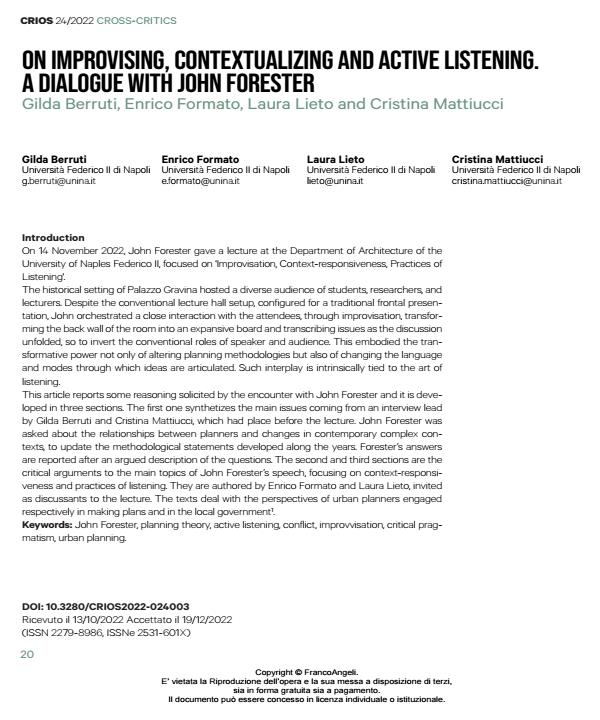On improvising, contextualizing and active listening. A Dialogue with John Forester
Journal title CRIOS
Author/s Gilda Berruti, Enrico Formato, Laura Lieto, Cristina Mattiucci
Publishing Year 2024 Issue 2022/24 Language English
Pages 14 P. 20-33 File size 2467 KB
DOI 10.3280/CRIOS2022-024003
DOI is like a bar code for intellectual property: to have more infomation
click here
Below, you can see the article first page
If you want to buy this article in PDF format, you can do it, following the instructions to buy download credits

FrancoAngeli is member of Publishers International Linking Association, Inc (PILA), a not-for-profit association which run the CrossRef service enabling links to and from online scholarly content.
On 14 November 2022, John Forester gave a lecture at the Department of Architecture of the University of Naples Federico II, focused on 'Improvisation, Context-responsiveness, Practices of Listening'. The historical setting of Palazzo Gravina hosted a diverse audience of students, researchers, and lecturers. Despite the conventional lecture hall setup, configured for a traditional frontal presentation, John orchestrated a close interaction with the attendees, through improvisation, transforming the back wall of the room into an expansive board and transcribing issues as the discussion unfolded, so to invert the conventional roles of speaker and audience. This embodied the transformative power not only of altering planning methodologies but also of changing the language and modes through which ideas are articulated. Such interplay is intrinsically tied to the art of listening. This article reports some reasoning solicited by the encounter with John Forester and it is developed in three sections. The first one synthetizes the main issues coming from an interview lead by Gilda Berruti and Cristina Mattiucci, which had place before the lecture. John Forester was asked about the relationships between planners and changes in contemporary complex contexts, to update the methodological statements developed along the years. Forester’s answers are reported after an argued description of the questions. The second and third sections are the critical arguments to the main topics of John Forester’s speech, focusing on context-responsiveness and practices of listening. They are authored by Enrico Formato and Laura Lieto, invited as discussants to the lecture. The texts deal with the perspectives of urban planners engaged respectively in making plans and in the local government1.
Keywords: John Forester, planning theory, active listening, conflict, improvvisation, critical pragmatism, urban planning.
- Forester J. (2006). Making participation work when interests conflict: Moving from facilitating dialogue and moderating debate to mediating negotiations. Journal of the American Planning Association, 72(4): 447-456.
- Forester J. (2009). Dealing with differences: Dramas of mediating public disputes. Oxford: University Press.
- Forester J. (2013a). Planning in the face of conflict: The surprising possibilities of facilitative leadership. New York: APA.
- Forester J. (2013b). On the theory and practice of critical pragmatism: Deliberative practice and creative negotiations. Planning theory, 12(1): 5-22.
- Forester J. (2019). Ecological wisdom through deliberative improvisation: Theory and practice in challenging cases. Journal of Urban Management, 8(1): 12-19.
- Forester J. (2021). Our curious silence about kindness in planning: Challenges of addressing vulnerability and suffering. Planning Theory, 20(1): 63-83.
- Forester J. (2022). Options Analysis as Context-Responsiveness in Practice: Integrating Diagnosis, Expertise, and Negotiation (Refining Communicative Planning and Critical Pragmatism), Planning Theory & Practice, Taylor & Francis Journals, vol. 23(5): 663-680.
- Knapp C., Poe J., & Forester J. (2022). Repair and healing in planning. Planning Theory & Practice, 23(3): 425-458.
Gilda Berruti, Enrico Formato, Laura Lieto, Cristina Mattiucci, On improvising, contextualizing and active listening. A Dialogue with John Forester in "CRIOS" 24/2022, pp 20-33, DOI: 10.3280/CRIOS2022-024003